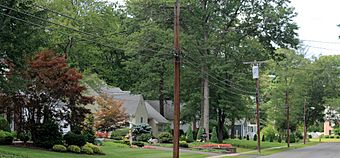Hartford Golf Club Historic District facts for kids
Quick facts for kids |
|
|
Hartford Golf Club Historic District
|
|
 |
|
| Location | Roughly bounded by Simsbury Rd. and Bloomfield Ave., Northmoor Rd., Albany Ave., and Mohegan Dr., Hartford, Connecticut |
|---|---|
| Area | 500 acres (200 ha) |
| Built | 1915 |
| Architect | Hayman, Milton E.; Et al. |
| Architectural style | Colonial Revival, Tudor Revival, French Norman Chateau |
| NRHP reference No. | 86001370 |
| Added to NRHP | June 26, 1986 |
The Hartford Golf Club Historic District is a special area in West Hartford and Hartford, Connecticut. It includes a famous golf course and a neighborhood with many beautiful old houses. This district was built between 1915 and 1936.
The golf course was designed by a famous golf course architect named Donald Ross. The houses in the neighborhood are known for their unique styles, like Colonial Revival and Tudor Revival. This whole area was added to the National Register of Historic Places in 1986. This means it's an important place to protect because of its history and special buildings.
Contents
History of the Hartford Golf Club
The Hartford Golf Club started way back in 1896. It quickly became a popular spot for important people in Hartford. Their first golf course was built in a different spot, but it had some problems because of the land.
Designing the Golf Course
In 1914, the club bought new land for a better course. They hired Donald Ross, a very well-known golf course designer, to create the holes. He designed fourteen holes in this new area. Later, they added more holes to make a full eighteen-hole course.
In 1945, the club bought even more land. They added thirteen new holes, which were also likely designed by Donald Ross. This helped make the golf course what it is today.
Historic Homes and Neighborhood
When the golf club bought its new land in 1914, it led to a building boom nearby. Over the next twenty years, many high-quality homes were built around the golf course.
Popular Architectural Styles
These homes were built in popular styles like Tudor Revival and Colonial Revival. They often had large, well-kept yards. This area quickly became one of West Hartford's most fashionable places to live. The streets were laid out in big rectangles, and the houses closest to the golf course were usually the largest and most impressive.



